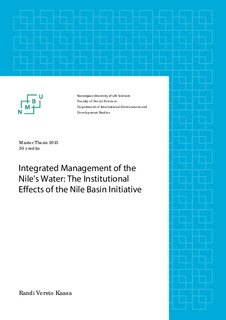| dc.description.abstract | The Nile is the world’s longest river shared and used by 11 countries, influencing 350 million people. Population growth and improved living standards has increased each Nile state’s demand for water, and the river has thus become a significant part of interstate politics. With the increasing demand for water, there is too an increasing need to jointly manage the Nile’s waters in an equitable and efficient way to meet the domestic, commercial and industrial needs for freshwater for all basin states.
The Nile basin states agree on the need to cooperate to jointly protect and manage the Nile’s waters, and have invested great amounts of time, efforts and resources to ensure equitable and efficient water use. This thesis looks at the efforts made to jointly manage the Nile’s water, namely the Nile Basin Initiative (NBI) and the process of establishing the Cooperative Framework Agreement (CFA). This thesis further reviews the effect of the NBI in managing the freshwater resources of the Nile. In particular, concepts of regime effectiveness are applied in the empirical analysis.
Based on the empirical and theoretical analysis, this thesis concludes that although NBI is facing important challenges for effective water management, the NBI is a vital milestone in the joint management of water. The initiative is an important catalyst for enhanced economic and political cooperation in the region, with potential benefits beyond that of the river itself. | nb_NO |
